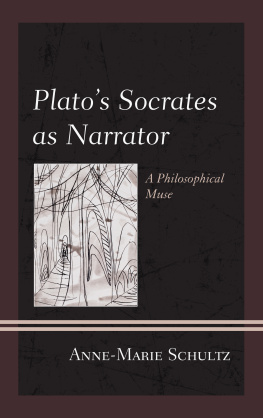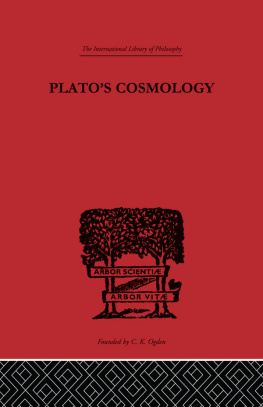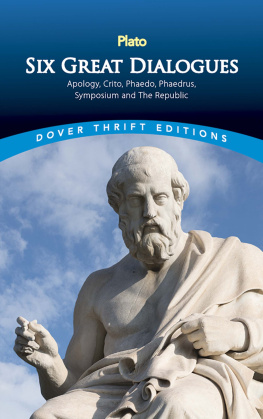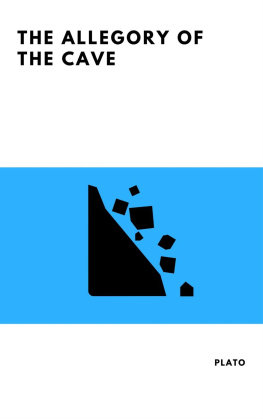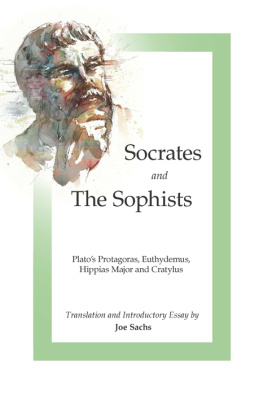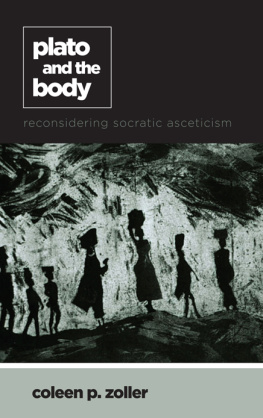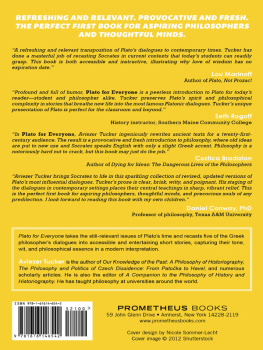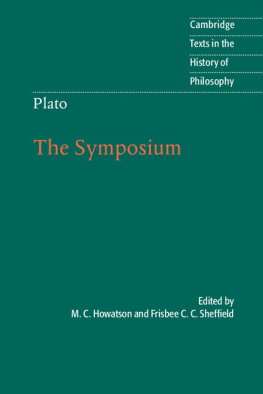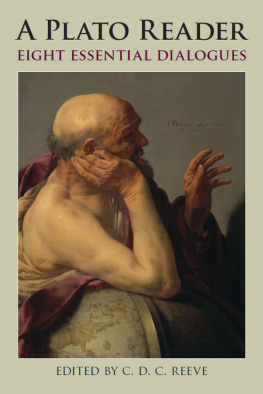
Table of Contents
FROM THE PAGES OF ESSENTIAL DIALOGUES OF PLATO
Socrates, you are always weaving the meshes of an argument, selecting the most difficult point, and fastening upon details instead of grappling with the matter in hand as a whole.
(from Shorter Hippias, page 29)
In my opinion the terrible and the hopeful are the things which do or do not create fear.
(from Laches, page 59)
The true order of going, or being led by another, to the things of love, is to begin from the beauties of earth and mount upwards for the sake of that other beauty, using these as steps only, and from one going on to two, and from two to all fair forms, and from fair forms to fair practices, and from fair practices to fair notions, until from fair notions he arrives at the notion of absolute beauty, and at last knows what the essence of beauty is.
(from Symposium, page 102)
I am one of those who are very willing to be refuted if I say anything which is not true, and very willing to refute anyone else who says what is not true, and quite as ready to be refuted as to refute; for I hold that this is the greater gain of the two, just as the gain is greater of being cured of a very great evil than of curing another. For I imagine that there is no evil which a man can endure so great as an erroneous opinion about the matters of which we are speaking.
(from Gorgias, pages 129-130)
The good is the end of all our actions.
(from Gorgias, page 173)
Beloved Pan, and all ye other gods who haunt this place, give me beauty in the inward soul; and may the outward and inward man be at one. May I reckon the wise to be the wealthy, and may I have such a quantity of gold as a temperate man and he only can bear and carry. Anything more? The prayer, I think, is enough for me.
(from Phaedrus, page 253)
Socrates is a doer of evil, who corrupts the youth; and who does not believe in the gods of the state, but has other new divinities of his own. Such is the charge.
(from Apology, page 283)
The unexamined life is not worth living.
(from Apology, page 295)
No evil can happen to a good man, either in life or after death.
(from Apology, page 298)
At this moment I realize that I have not the temper of a philosopher; like most people, I am only a partisan. Now the partisan, when he is engaged in a dispute, cares nothing about the rights of the question, but is anxious only to convince his hearers of his own assertions.
(from Phaedo, pages 348-349)
A stranger finding his way into great cities, and persuading the flower of the youth in them to leave the company of their kinsmen or any other acquaintances, old or young, and live with him, under the idea that they will be improved by his conversation, ought to be very cautious; great jealousies are aroused by his proceedings, and he is the subject of many enmities and conspiracies.
(from Protagoras, page 388)
No wise man, as I believe, will allow that any human being errs voluntarily, or voluntarily does evil and dishonourable actions; but they are very well aware that all who do evil and dishonourable things do them against their will.
(from Protagoras, page 414)
Immaterial things, which are the noblest and greatest, are shown only in thought and idea, and in no other way, and all that we are now saying is said for the sake of them. It is easier, however, to discuss with the mind on small matters than on great.
(from Statesman, page 463)
Can a kingship be destroyed, or was any other form of government ever destroyed, by any but the rulers themselves?
(from Laws III, page 545)
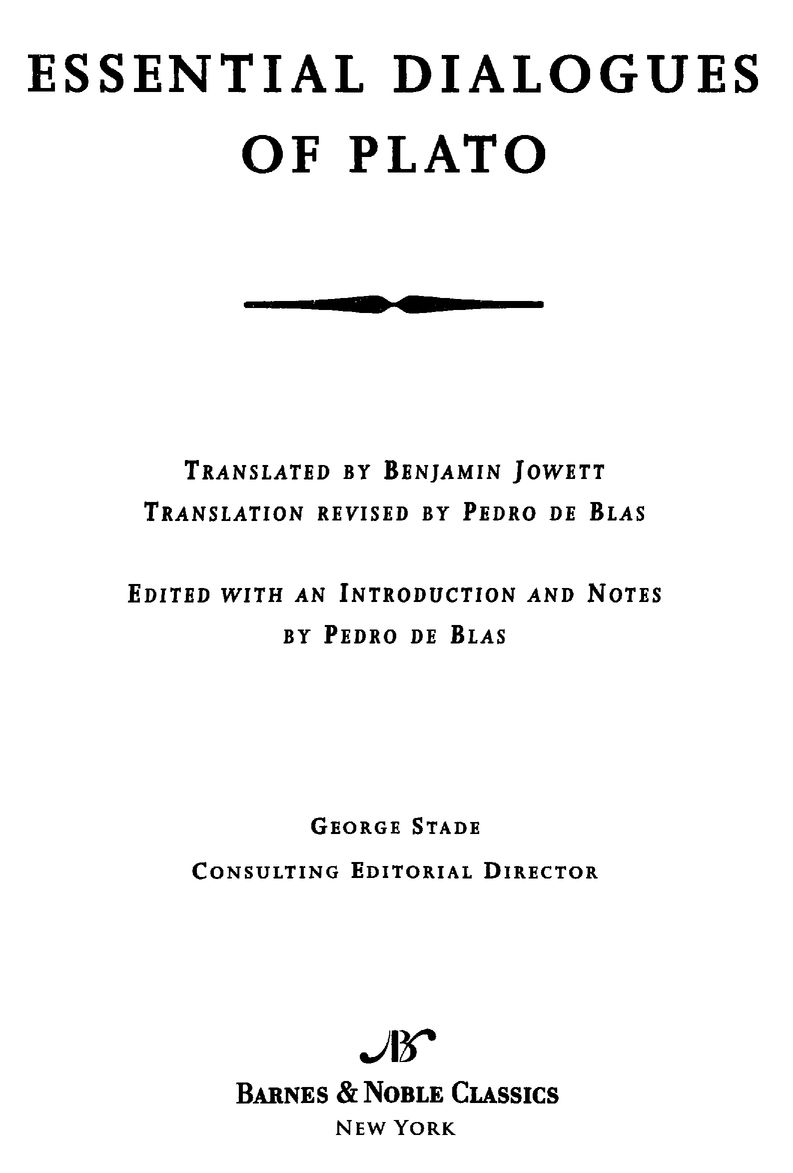
PLATO
Plato was born into a wealthy, aristocratic Athenian family in 428 or 427 B.C.E., and he lived until 348 or 347. He had kinship ties on both sides of his family with many prominent men in Athens. His father, Ariston, died when he was a child, and his mother, Perictione, was subsequently married to Pyrilampes. Plato was raised in Pyrilampes household along with his older brothers (Glaucon and Adeimantus), a stepbrother (Demos), and a half-brother (Antiphon). As young men, Plato and his brothers were close to Socrates.
Platos familial connections and wealth would have made it easy for him to embark on a political career in Athens. But he did not become politically active, perhaps because he became disillusioned with politics after witnessing, first, the brutal oligarchic regime of the Thirty Tyrants, who seized control of Athens at the end of the Peloponnesian War in 404 B.C.E., and then the execution of Socrates, who was condemned to die in 399 under the restored democratic government for not recognizing the gods recognized by the city and corrupting the youth.
Plato traveled in the years after Socrates death, and he almost certainly spent time in Megara (near Corinth) and Syracuse (on Sicily). He became close friends with Dion, a kinsman of the tyrant of Syracuse, Dionysius I. Plato probably traveled to Syracuse three times during the period from the early 380s to the late 360s. He and Dion evidently planned to educate the tyrants son, Dionysius II, in the hopes that, upon succeeding his father, he would put into practice the political ideals they cherished. But these hopes were never fulfilled. Upon taking power in the early 360s, Dionysius II broke with both his kinsman and his tutor.
In the early 380s, Plato began teaching what he called philosophy at a place near the grove of the hero Academus on the outskirts of Athens. The school came to be called the Academy because of its location, and Plato remained at its head until his death, when his nephew Speusippus took over its administration. After Platos death, the Academy continued to be an important center of research and study for many centuries, attracting students from all over the Mediterranean world.
Plato probably started to compose dialogues before he established the Academy. All but a few of his dialogues feature Socrates as the main interlocutor, and most are peopled with figures who would have been well known, especially in Athens elite circles, during the fifth century. A large body of writing attributed to Plato survives from antiquity, including Apology (a recreation of Socrates defense speech), numerous dialogues, and a series of letters. Most of these works are considered to be truly by Plato, although the authenticity of some texts (including some of the letters and a handful of dialogues) has been doubted at various points in the last 2,400 years.
THE WORLD OF PLATO
| 508 | Cleisthenes, son of Megacles, introduces sweeping political |
| B.C.E. | reforms to the Athenian constitution, marking the beginning of democratic government in Athens. |
| 490 | At the battle of Marathon (26.3 miles from Athens in Attica), Greek land forces, under the command of the Athenian Miltiades, son of Cimon, defeat an invading army of Persians. Most of the Greek troops who fight at Marathon come from Athens. |
| 480 | At the battle of Thermopylae (a mountain pass in northeastern Greece), Persian land forces fight against elite Spartan soldiers under the command of Leonidas, one of the Spartan kings. The entire Spartan force is killed in the battle. |



